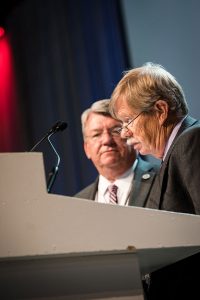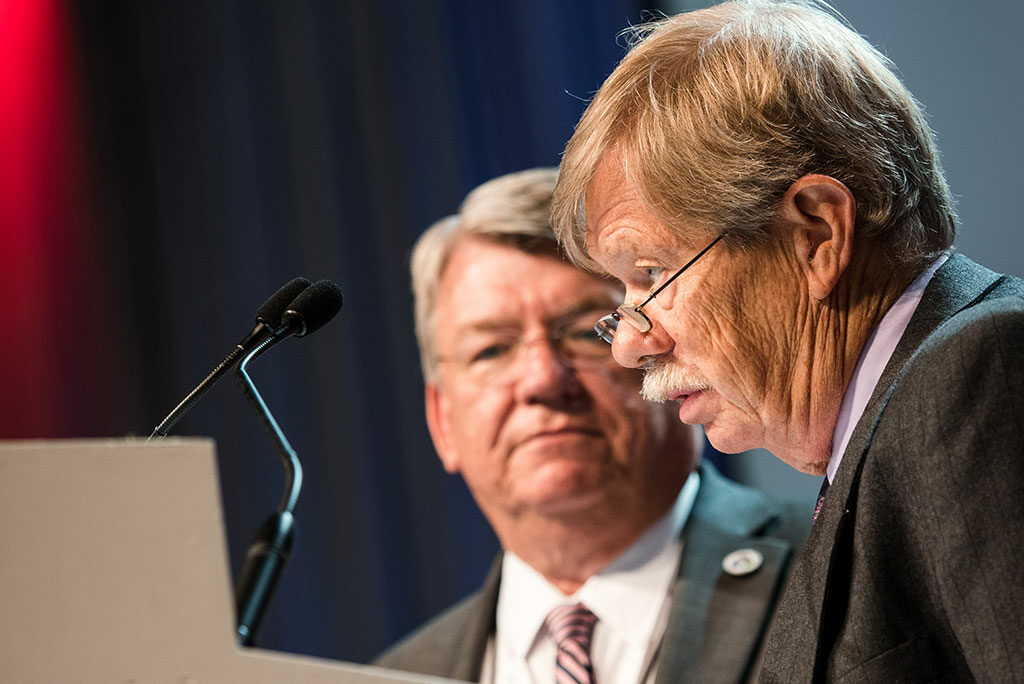By Pamela J. Nielsen
SCHAUMBURG, Ill. — At its Nov. 15-18 meeting, the LCMS Council of Presidents (COP) engaged in honest, lively discussion and debate covering a range of issues including ecclesiastical supervision, calling pastors on candidate status, immigration and seminary concerns.

The Council also heard reports from a host of Synod ministry leaders from the LCMS Offices of International and National Mission and Communications. In a joint session with the Synod Board of Directors, the two groups heard from LCMS Chief Financial Officer Jerald Wulf and other Synod leaders who provided a comprehensive picture of the state of the Synod as they reviewed finances, giving and demographic trends.
The Council of Presidents (made up of the 35 LCMS district presidents, the six Synod vice-presidents and its president) comes together to give counsel to the Synod president and to engage in counsel with one another regarding common concerns. Council Chairman and Texas District President Rev. Ken Hennings explained — especially for new COP members — how the agenda for the meetings is constructed.
Among the Council’s current mix of concerns are its ongoing tasks of ecclesiastical supervision (such as reinstatements and placement) and specific tasks given to the COP by the Synod in convention.
As part of the COP discussion, Synod President Rev. Dr. Matthew C. Harrison commented, “We’re working on [our differences] and we are trying to love each other in spite of ourselves. … This is the place to raise issues of concern and they should be raised here; it’s hard to do sometimes. … We’ll keep doing the best we can.”
The first day of the meeting was devoted to face-to-face discussions in the seven small groups of Council members mandated by the 2016 convention for the “Koinonia Project.” By all accounts, these groups have proven effective in helping the Council work toward greater agreement under the Word of God.
President’s report
At the beginning of Harrison’s report, he and Northwest District President Rev. Dr. Paul Linnemann offered a mutual confession of sin. Absolution and mutual forgiveness were spoken in the name of Christ and received in the manner of Christian brothers.
Harrison continued his report by noting plans for the next round of district visitations that he and the Synod vice-presidents conduct and updates from the Concordia University System and the Lutheran Center for Religious Liberty. He also addressed the topic of immigration and the Synod’s relationship to Lutheran Immigration and Refugee Service, and questions regarding the Synod’s relations with partner churches.
The president turned the second half of his time before the Council over to the Rev. Dr. Al Collver III, LCMS director of Church Relations and executive secretary of the International Lutheran Council (ILC). Collver provided an overview of the state of global Lutheranism as he reported on his often-parallel work for the LCMS and the ILC. He described various meetings, conferences he has attended and the theological matters he has discussed with Lutheran church leaders on several continents.
“We have really pushed the ILC to develop a strategic plan to create capacity,” said Harrison at the conclusion of Collver’s report, as he noted the roles of this growing alliance of confessional Lutheran church bodies in assisting with global theological education, mercy work and in developing and presenting theological statements as a body of churches.
Candidate-status pastors
The Council resumed its commitment to reviewing the list of pastors who are presently on candidate status and reviewed questions regarding the process and procedures for various categories of pastors on candidate status. In executive session at each COP meeting, one-fourth of the candidate pastors in the Synod are reviewed and discussed by name and those who are able to be considered for calls are noted and deliberated.
In addition, the Council continued its ongoing discussion on ecclesiastical supervision and heard a comprehensive report on the history of ecclesiastical supervision in the LCMS by the Rev. Dr. Gerhard Bode of the Concordia Seminary, St. Louis, faculty and Synod Secretary Rev. Dr. John W. Sias.
COP Secretary Rev. Dr. Chris Wicher provided the vacancy report, in which he noted that there are 312 congregations seeking sole pastors, 47 congregations seeking senior pastors and 75 congregations seeking associate or assistant pastors. There are 357 part-time pastors. He also reported 12 new ministry starts and said that 10 congregations closed their doors since the last report in September.
Other business
On the final day of their meeting, the COP welcomed the Commission on Constitutional Matters (CCM) and reviewed various changes to the Synod Handbook, as a result of the 2016 LCMS convention. CCM Chairman Rev. Dr. George Gude clarified that the review of candidate-status rostered workers’ eligibility to continue in that status is an annual responsibility of the district president and informed the group that in keeping with Res 9-02A, the CCM will be asking to review the bylaws and articles of every agency of Synod to meet a convention-mandated 2019 deadline.
First Vice-President Rev. Dr. Herbert Mueller reviewed with the group the work of the committee of the COP developing the policies and procedures necessary to implement 2016 Res 13-02A — to regularize, by colloquy to the Specific Ministry Pastor roster, the service of licensed lay deacons.
The COP will next meet in February.
“We’re getting more face-to-face [and] the younger guys who’ve just come on have drawn the older guys into more substantive conversation and dealing with whatever issue we are facing, doing that in a very civilized manner,” said Central Illinois President Rev. Mark Miller, reflecting on the three-day meeting. “Things have been run very well.”
Regarding debate and discussions in the meeting, Miller said, “I think we were open and honest in our conversation and I think we inch our way to a more productive conversation and discussion in the COP.”
Deaconess Pamela J. Nielsen (pamela.nielsen@lcms.org) is associate executive director of LCMS Communications.
Posted December 19, 2016
